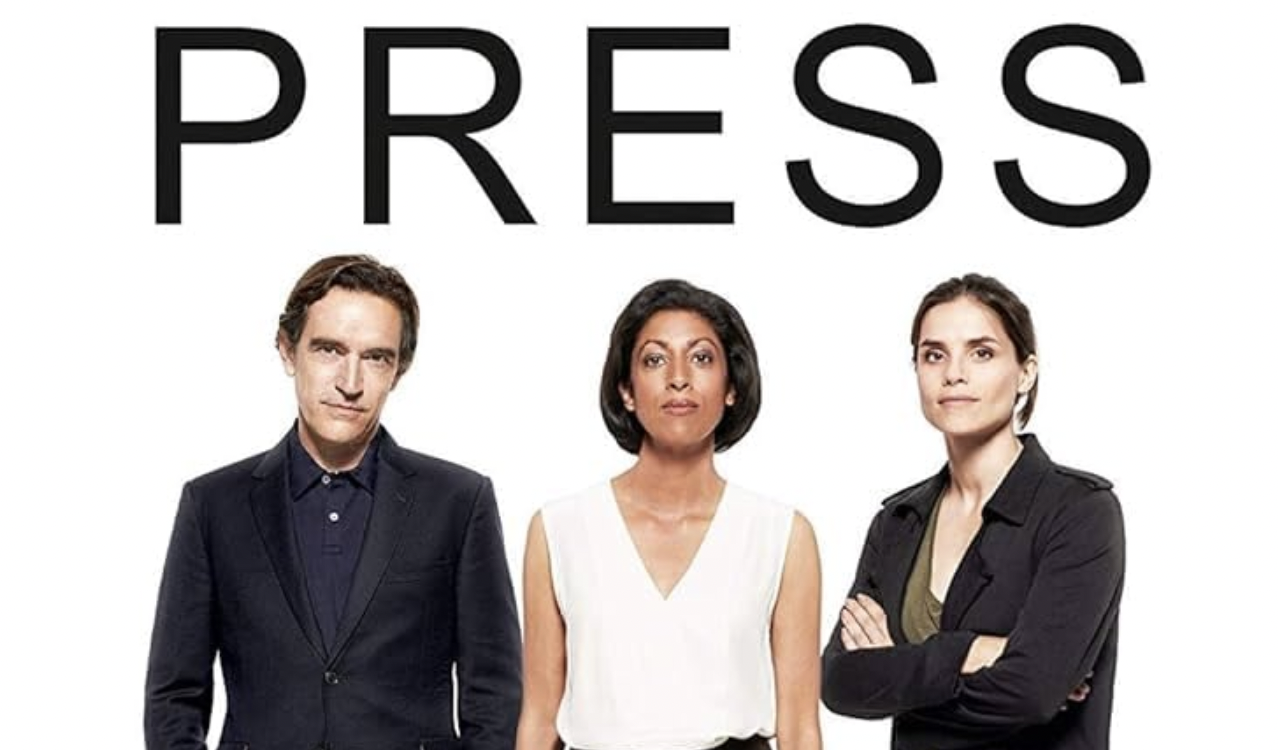The Rise of the Lakers Dynasty on HBOmax
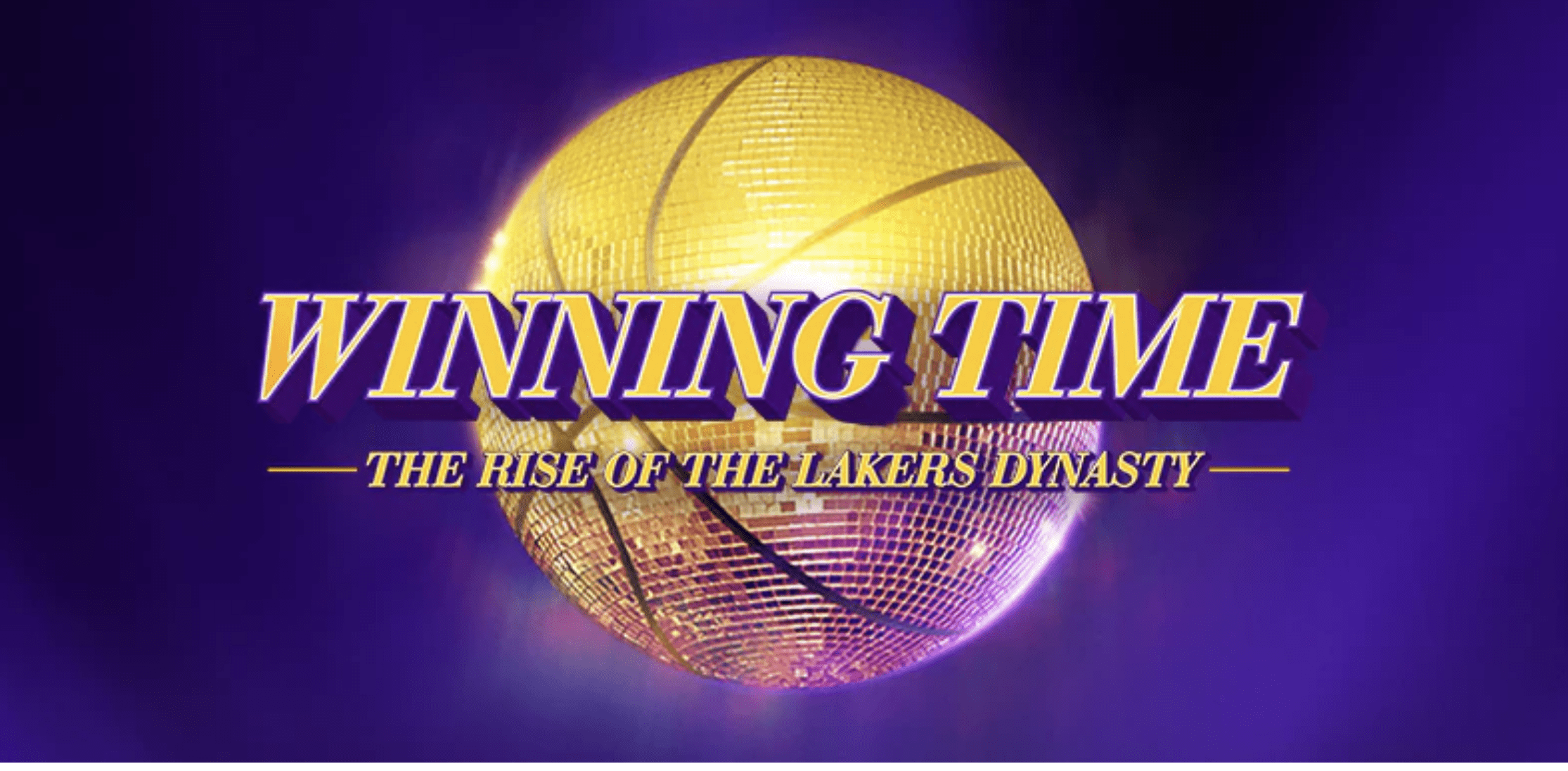
The Rise of the Lakers Dynasty on HBOmax – The professional and personal lives of the 1980s Los Angeles Lakers, one of sports’ most revered and dominant dynasties – a team that defined an era, both on and off the court.
Dramatic miniseries about the glitz and glamour of 1980s Los Angeles and the rise of the NBA’s Lakers, Dr. Jerry Buss and Magic Johnson.
The Rise of the Lakers Dynasty on HBOmax – A fast-break drama series that goes back in time to chronicle the professional and personal lives of the 1980s Los Angeles Lakers, one of sports’ most revered and dominant dynasties.
Based on Jeff Pearlman’s book, Showtime: Magic, Kareem, Riley, and the Los Angeles Lakers, and executive produced by Adam McKay (Succession, Q: Into the Storm), the show takes a look at a team that defined its era, both on and off the court.
The Rise of the Lakers Dynasty on HBOmax – is an American sports drama television series created by Max Borenstein and Jim Hecht for HBO, based on the book Showtime: Magic, Kareem, Riley, and the Los Angeles Lakers Dynasty of the 1980s by Jeff Pearlman.
Beginning with the arrival of Earvin “Magic” Johnson as the #1 overall pick of the 1979 draft, the Lakers played basketball with gusto and pizzazz, unleashing their famed “Showtime” run-and-gun style on a league unprepared for their speed and ferocity and became the most captivating show in sports and, arguably, in all-around American entertainment.
The Rise of the Lakers Dynasty on HBOmax – The Lakers’ roster overflowed with exciting all-star-caliber players, including center Kareem Abdul-Jabbar, and they were led by the incomparable Pat Riley, known for his slicked-back hair, Armani suits, and arrogant strut.
Hollywood’s biggest celebrities lined the court and gorgeous women flocked to the arena.
Best of all, the team was a winner.
The Rise of the Lakers Dynasty on HBOmax – Between 1980 and 1991, the Lakers played in an unmatched nine NBA championship series, capturing five of them.
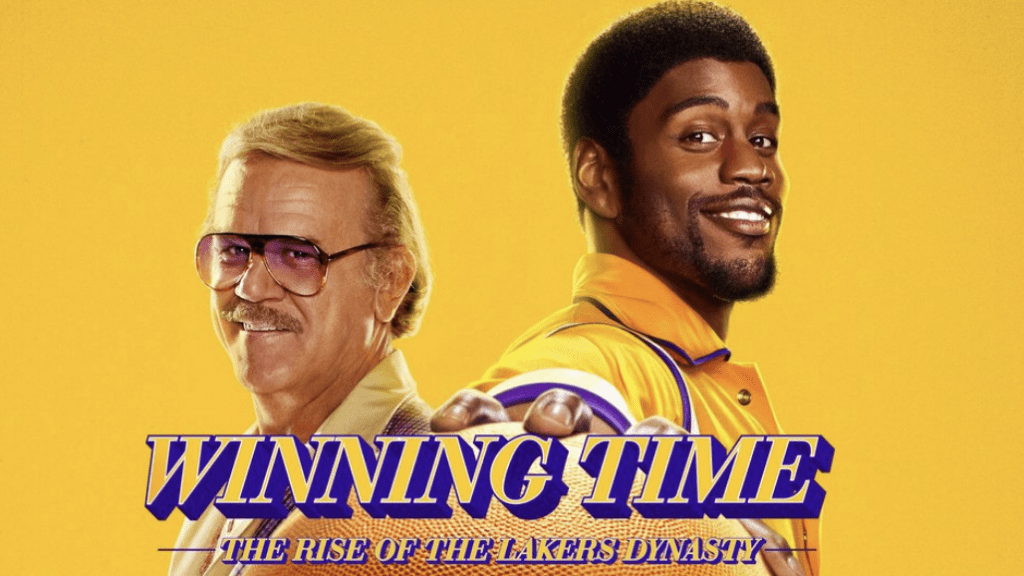
The ensemble cast includes: John C. Reilly, Jason Clarke, Adrien Brody, Quincy Isaiah, Sally Field, and Jason Segel, among many others.
Max Borenstein serves as Showrunner, Executive Producer, Writer, and Co-Creator. Jim Hecht is Co-Writer of Story, Executive Producer, and Co-Creator. Jason Shuman, Scott Stephens, and Rodney Barnes also join as Executive Producers.
You can gather a lot from the trailer above, but one thing that it omits is that Winning Time is based on the 2014 book by Jeff Pearlman, Showtime: Magic, Kareem, Riley and the Los Angeles Lakers Dynasty of the 1980s.

The Rise of the Lakers Dynasty on HBOmax
The Rise of the Lakers Dynasty on HBOmax – The book follows the Lakers from their selection of Earvin “Magic” Johnson with the first overall pick in the 1979 NBA draft and dives into all of the larger-than-life personalities that made up the team, including other players like Kareem Abdul-Jabbar and head coach Pat Riley, and the run-and-gun style of play they used that became must-watch and helped define that era of basketball.
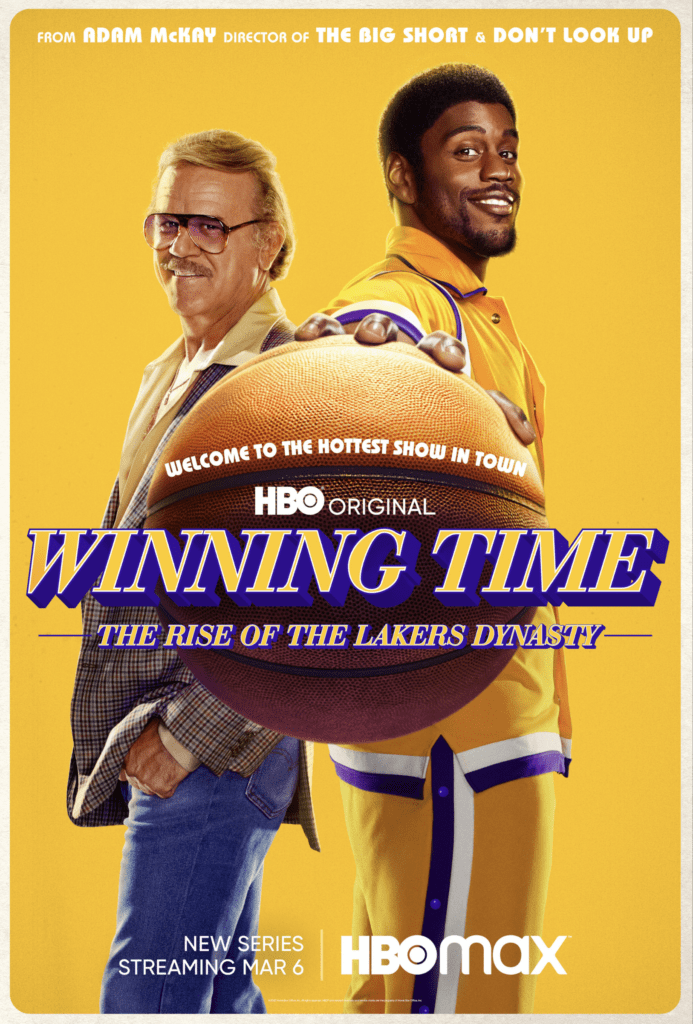
The Rise of the Lakers Dynasty on HBOmax – The Episodes
The Swan
1979. Businessman Jerry Buss stakes his fortune on the purchase of the NBA’s lackluster Los Angeles Lakers.
Meanwhile, the team’s head coach, Jerry West, bristles at the prospect of drafting college phenom Earvin Johnson – who must decide if he’s ready to live up to the mantle of his nickname: Magic.
Is That All That There Is?
After giving Coach West carte blanche with the Lakers roster, Buss attempts to charm fellow franchise owner of the Celtics, Red Auerbach.
Meanwhile, Earvin’s efforts to impress the women in his life fall flat, and Claire’s mandate to get creative brings conflict with Buss’ daughter, Jeanie.
The Good Life
Leaving the Lakers to deal with the fallout of Coach West’s shocking announcement, Buss travels to Las Vegas, and soon becomes entangled with a dangerous foe.
Back in LA, Earvin finds himself alone in a new city, while former Laker Pat Riley seeks out a new place within the team.
Who the F**k Is Jack McKinney?
As the Lakers head to Palm Springs for the start of training camp, Buss finds himself in over his head financially, and the team’s new coaches struggle to prove their vision for a groundbreaking method of play.
Meanwhile, Jeanie works to bring her father’s flair to the Forum.
Pieces of a Man
As the Lakers prepare for their season opener against the Clippers, an increasingly frustrated Kareem begins to doubt his place on the team – allowing Coach McKinney to stoke his growing rivalry with Earvin.
Jeanie courts star talent for newly minted cheer squad, the Laker Girls, including a promising young dancer, Paula Abdul.
Momento to Mori
Assistant coach Paul Westhead adds to the Lakers’ growing list of problems when he finds himself dealing with a tragedy of Shakespearean proportions.
Increasingly courted by corporate sponsors, Earvin consults a newfound financial advisor.
Invisible Man
While Buss clashes with West over the coaching staff, Paul calls in a favor from Pat Riley.
On the road for the first time, Earvin attempts to reconnect with loved ones in Lansing, before heading to Boston to square off against longtime rival Larry Bird.
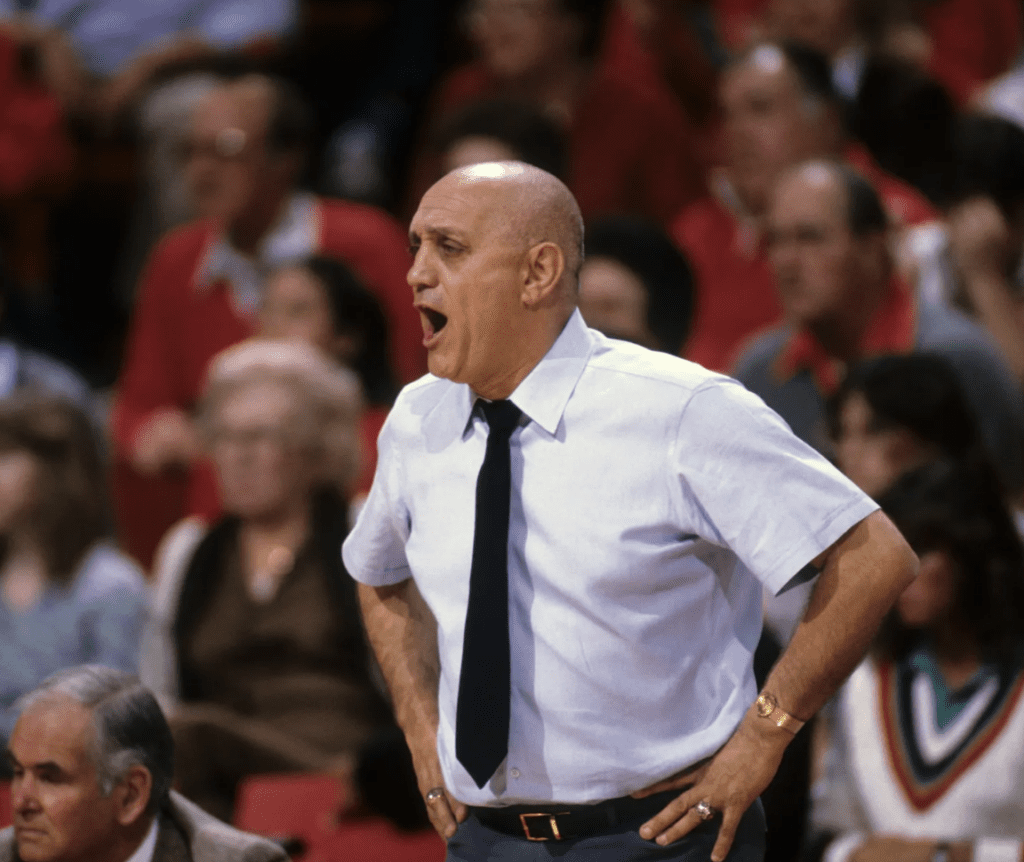
How Close Was Jerry Tarkanian to Signing With the Lakers?
The main storyline of episode three of “Winning Time” is new Lakers owner Jerry Buss’ pursuit of a new head coach, a search that quickly zooms in on UNLV head coach Jerry Tarkanian.
In another example of Buss’ innovative eye, he sought out Tarkanian a decade before he won a national title with the Runnin’ Rebels, though he was hardly a no-name coach.
“I loved Las Vegas, my family loved Las Vegas,” Tarkanian said. “When the Lakers reached out, I immediately said to my wife, ‘I can’t take the job, right? I just can’t.’”
Still, to be polite, Tarkanian returned Cooke’s call, explaining that, even if he were interested in moving to California, it’d have to be for, ohhhhh . . . a helluva lot more than the $70,000 offered last time.
“Like what?” Cooke said. “Well,” said Tarkanian. “It’d have to be double the $350,000 I make right now.” “That’s fine,” Cooke said. “What?” said Tarkanian. “That’s fine,” Cooke repeated. “We can do that.”
So here was Vic Weiss, moments after concluding with Cooke and Buss, briefcase in hand, approaching the valet parking station at the Comstock, happy as could be.
Not only were the Lakers willing to make Tarkanian the NBA’s all-time highest-paid coach, they also ceded to his demands: a pair of season tickets for every home game, three luxury automobiles—one for Jerry, one for his wife, Lois, one for Pamela, their oldest daughter.
It was far from unusual to see Weiss standing ringside, talking shop with known mobsters.
What detectives later learned was that Weiss, the ultimate showman, had little to show.
Though he told people he possessed the three car dealerships, he actually was merely a paid consultant.
His Encino home was owned by an associate, and his car—the maroon-and-white Rolls-Royce—was leased.
Weiss had run up more than $60,000 in gambling debts and—at the time of his death—was flying back and forth from Los Angeles to Las Vegas to deliver bundles of laundered cash.
Vic Weiss’s murder, though, had changed things. With the death came the news (hidden until this point) of the coaching transaction.
The people of Las Vegas reached out.
Please don’t leave.
We need you.
You need us.
You are Las Vegas.
The Tarkanians had four children, none of whom wanted to depart.
Maybe, just maybe, money wasn’t everything.
Maybe $700,000 wasn’t worth giving up the job he loved most. “I don’t think Jerry ever got past Vic’s death,” said Lois. “He just didn’t get past it.”
When Tarkanian called Buss to tell him he had decided to remain in Las Vegas, the new Lakers owner held no grudge. “I understand,” he said. “Some things just aren’t meant to be.”
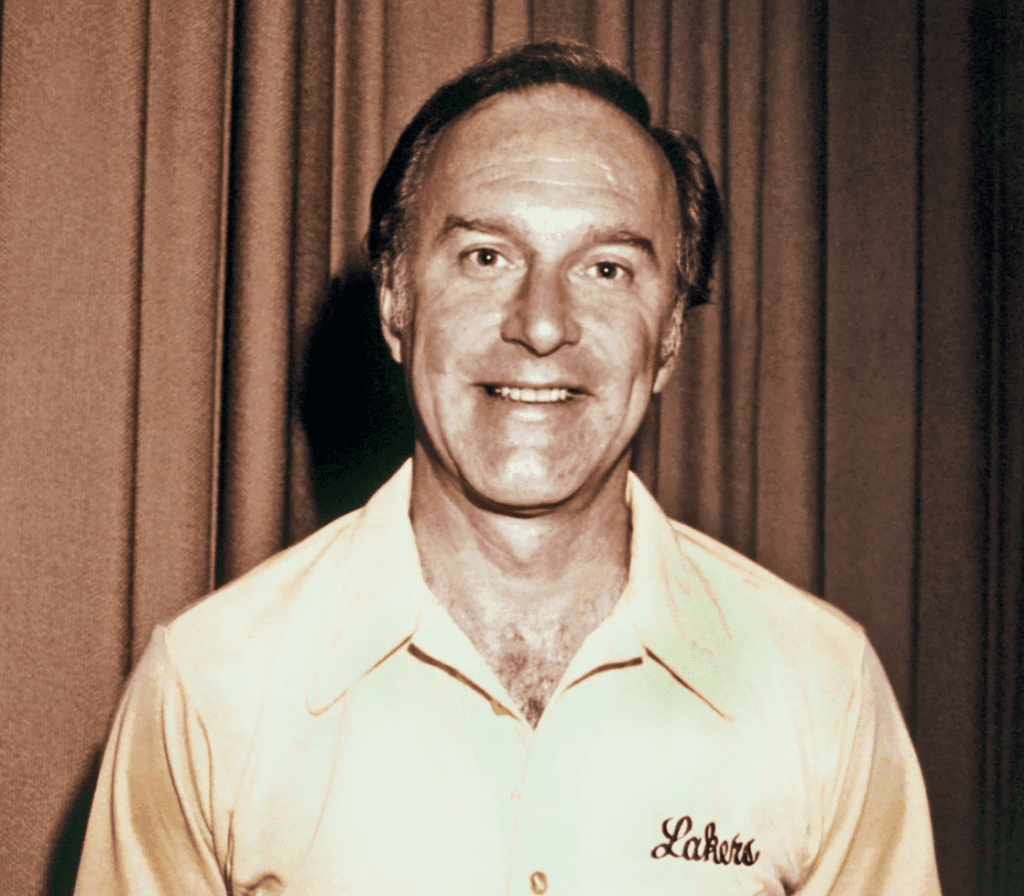
Did Jack McKinney Really Have a Bike Wreck
The Rise of the Lakers Dynasty on HBOmax – It was a day off on Nov. 8, 1979, when McKinney — whose Lakers were off to a hot start at 9-4 — took the free time as an opportunity to play tennis with assistant coach Paul Westhead, all as accurately portrayed in the show.
And his wife was using the car for a human and personal relationships class with Cassie Westhead, wife of assistant coach Paul, so Jack and Paul himself opted to play tennis together.
Because of an accident in Portland prior to him moving to LA to coach the Lakers, the McKinneys only had one car so Jack took his son’s bike to travel through his Palos Verdes neighborhood.
At an intersection at the bottom of a hill at the corner of Whitney Collins Drive and Stonecrest Road, McKinney applied the brakes, but they locked up.
It is still unknown if this was due to a brake failure itself as portrayed in the show, but the end result was the same: McKinney flew over the handlebars and face-first into the pavement.
He does not remember the incident, nor much of the ensuing weeks.
The situation was dire enough that only close family was allowed to see him in the hospital, with even Dr. Jerry Buss and Kareem Abdul-Jabbar being turned away.
Westhead was only allowed to see him because McKinney’s wife lied and said the two were brothers, an indicator of just how close the two families were.
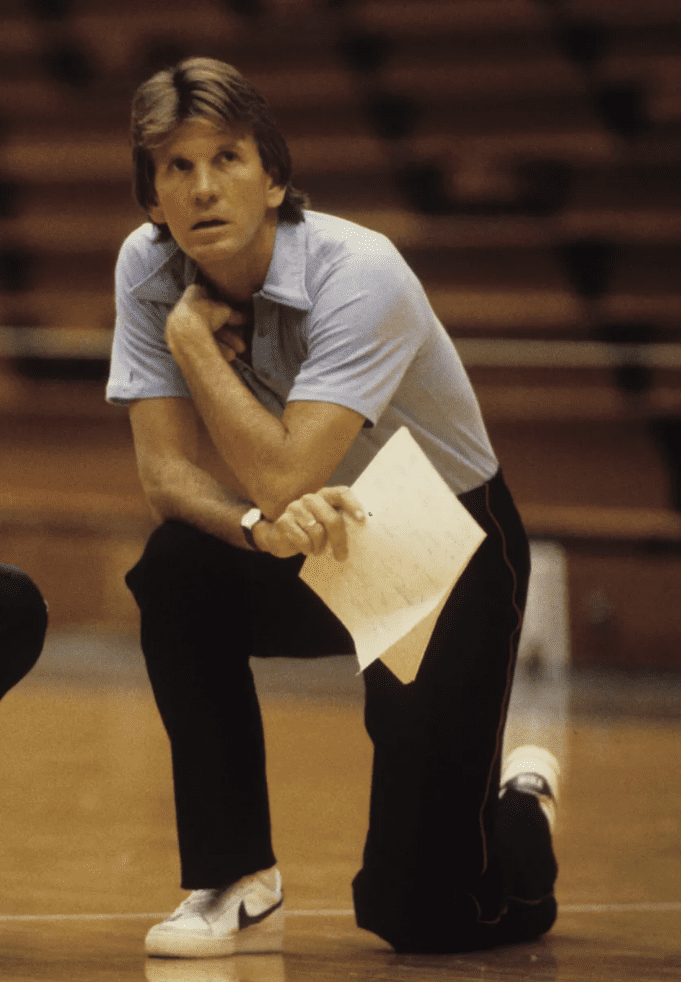
How Paul Westhead Really Prepared to be Lakers Coach
Afterward, Westhead and his players took ten minutes to meet in the locker room.
They talked about marching forward; about being strong; about the upcoming schedule and the following day’s practice.
Mostly, they talked about McKinney, and playing on his behalf.
“It should be very clear that this is Jack McKinney’s team,” Westhead later said, “and I am just running out the string until he returns.
I have no intention of changing anything.
There will be variations, but they will be variations, not changes.
I will accentuate what we’ve been building on, which is the running game, but it’s not new.
On November 16, more than a week after McKinney’s accident, Buss finally allowed Westhead to hire his assistant of choice.
The owner had been pushing for Elgin Baylor, the former Laker All-Star who lived locally.
Westhead, however, wanted a recently retired journeyman named Pat Riley.
Buss hemmed and hawed when Westhead initially pushed forth the idea.
The former Laker player, who had averaged 7.4 points over a ten-year career, was performing quite capably in his third season as Chick Hearn’s on-air broadcasting sidekick.
Furthermore, as far as coaching material went, Riley impressed no one. ”He really had the potential to have a long, great career in the booth,” said Keith Erickson, who replaced Riley when he shifted to the bench. “Chick could be very difficult to work with.
He was a wonderful man, but demanding. Pat had the right temperament.”
According to Basketball-Reference, Westhead led the Lakers to a 50-18 record after taking over for McKinney, good for the West’s No. 1 seed and a first-round bye.
LA advanced to the NBA Finals after defeating the Suns in the Conference Semifinals and the SuperSonics in the Conference Finals.
Westhead’s time with the Lakers was limited, however, as publicly bumping heads with Johnson led to the coach’s dismissal in 1981
When Westhead was dismissed six games into the 1981-82 season, Riley was named as the Lakers interim head coach.
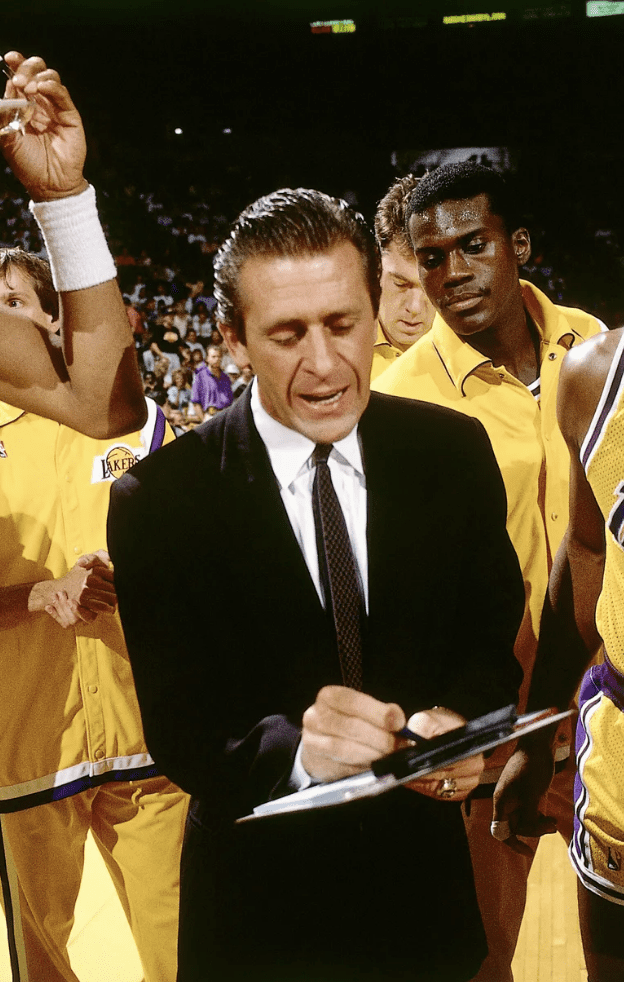
Pat Riley’s Road From Interim Coach to Head Coach of the Lakers
The Rise of the Lakers Dynasty on HBOmax -Patrick James Riley is an American professional basketball executive and a former coach and player in the National Basketball Association.
He has been the team president of the Miami Heat since 1995, and he also served as the team’s head coach from 1995 to 2003 and again from 2005 to 2008.
After retiring as a player, Riley worked as a television broadcaster for the Lakers beginning in 1977.
He stayed in this post until 1979.
At the start of the 1979-80 season, Riley accepted an offer from Paul Westhead, the head coach of the Lakers to become his assistant coach.
Riley took over as head coach of the Los Angeles Lakers early in the 1981-82 season.
Riley ushered in the Lakers’ “Showtime” era, along with superstar players Johnson and Abdul-Jabbar with their running game.
In his very first season in the top coaching position, the Lakers won the NBA Championship.
During the nine years Riley was head coach for the Lakers, the team won four NBA titles in seven NBA Finals appearances.
Riley also led the Lakers to 60 wins four seasons in a row (1984-85 through the 1987-88 season).
Under Riley, the Lakers won every division title, and won 50 or more games in each of the nine seasons Riley led them.
The Lakers’ win-loss record under Riley was 533-194. In 1990, Riley earned the first of his Coach of the Year awards.
He told the Washington Post’s Anthony Cotton after winning the award, “I don’t want to belittle the award—it does mean something—but I think I became a good coach when I stopped worrying about things like recognition.”
In 2001, Pat Riley passes the 1,000 wins in the NBA mark.
Moreover, he is a nine-time NBA Champion. The former basketball player won his first NBA title while playing for the Los Angeles Lakers.
After that, he won his second NBA Championship as an assistant coach of the Lakers.
Finally, he won five NBA titles while serving as a coach in the league.
Riley became a celebrity in his own right, a fashion icon for his Armani suits and slicked-back hair which complimented the team’s Hollywood image.
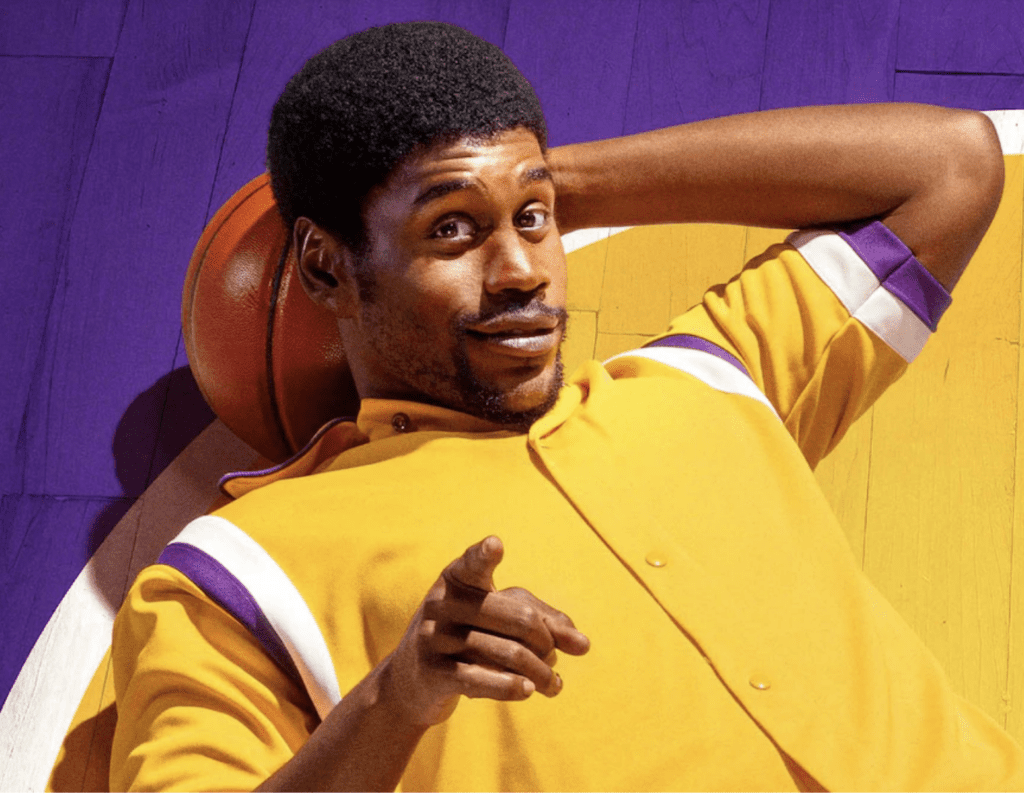
Earvin “Magic” Johnson Jr
The Rise of the Lakers Dynasty on HBOmax – Earvin “Magic” Johnson Jr. is an American former professional basketball player and former president of basketball operations of the Los Angeles Lakers of the National Basketball Association.
Magic Johnson, byname of Earvin Johnson, Jr., (born August 14, 1959, Lansing, Michigan, U.S.), American basketball player who led the National Basketball Association (NBA) Los Angeles Lakers to five championships.
The son of an autoworker, Johnson earned his nickname “Magic” in high school for his creative and entertaining ballhandling.
He was an intense competitor who led his high school team to a state championship in 1977 and led Michigan State University to the National Collegiate Athletic Association championship in 1979—handing Larry Bird and Indiana State its only defeat of that season.
Johnson left Michigan State after his sophomore season and was selected by the Lakers with the first overall pick in the 1979 NBA draft.
Six games into the 1981–82 season, Magic Johnson said he wished to be traded because he was unhappy playing for Westhead.
Shortly afterward, Lakers’ owner Jerry Buss fired Westhead.
At an ensuing press conference, with Jerry West at his side, Buss named West head coach.
West, however, balked, and Buss awkwardly tried to name West as “offensive captain” and then named West and Riley as co-coaches.
West made it clear during the press conference that he would only assist Riley, and that Riley was the head coach.
Thereafter, Riley was the interim head coach, until his status became permanent.
In November 1991, during a routine physical examination for an insurance policy, Johnson found out that he was a carrier of the HIV virus.
Johnson admitted that his lifestyle as a sports celebrity included extensive heterosexual promiscuity.
However, he never suspected that he might contact HIV, which he thought was limited to homosexual men.
The Lakers team physician advised Johnson to quit basketball immediately in order to safeguard his threatened immune system.
Johnson shared his discovery with the other players on the Laker team, then announced to the American people that he was HIV-positive.
On November 7, 1991, Johnson shocked the basketball world—and made headlines around the globe—when he announced that he was HIV-positive and was immediately retiring from the sport.
At the time of his initial retirement, Johnson was the NBA’s all-time leader in assists (9,921; broken in 1995 by John Stockton).
He returned to basketball to participate in the 1992 All-Star Game (of which he was the MVP) and in the Barcelona 1992 Olympic Games, where he helped the NBA-superstar-laden “Dream Team” capture the men’s basketball gold medal.
Later he served briefly as head coach of the Lakers (1994), and he also played with the team for a portion of the 1995–96 season.
He was a minority owner of the franchise from 1994 to 2010.
The Rise of the Lakers Dynasty on HBOmax – History
Who owned the Lakers before Jerry Buss?
The Rise of the Lakers Dynasty on HBOmax – Now let us read about who this team’s owner was before Jerry’s Bus.
So, the answer for Who Owned the Lakers Before Jerry Buss is Jack Kent Cooke.
He became the team owner in the year 1965 and kept the ownership for almost thirteen years till 1979.
The Rise of the Lakers Dynasty on HBOmax – Beginning with the arrival of Earvin “Magic” Johnson as the #1 overall pick of the 1979 draft, the Lakers played basketball with gusto and pizzazz, unleashing their famed “Showtime” run-and-gun style on a league unprepared for their speed and ferocity and became the most captivating show in sports and, arguably, in all-around American entertainment.
The Lakers’ roster overflowed with exciting all-star-caliber players, including center Kareem Abdul-Jabbar, and they were led by the incomparable Pat Riley, known for his slicked-back hair, Armani suits, and arrogant strut.
Hollywood’s biggest celebrities lined the court and gorgeous women flocked to the arena.
Best of all, the team was a winner.
The Rise of the Lakers Dynasty on HBOmax -Between 1980 and 1991, the Lakers played in an unmatched nine NBA championship series, capturing five of them.
What to Binge Watch on Netflix >>
What to Binge Watch on Amazon Prime >>
What to Binge Watch on HBO, Paramount + & Showtime >>

